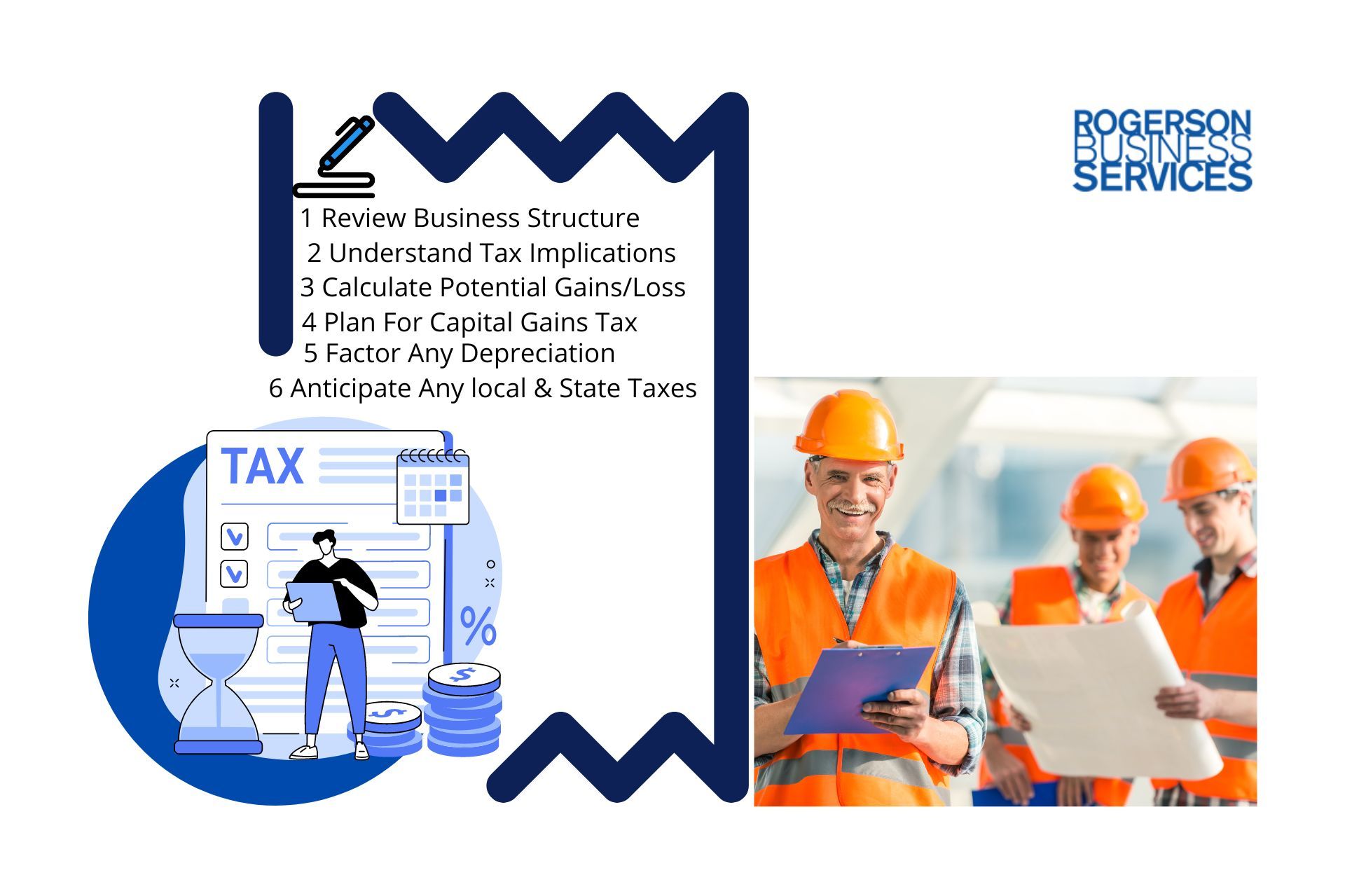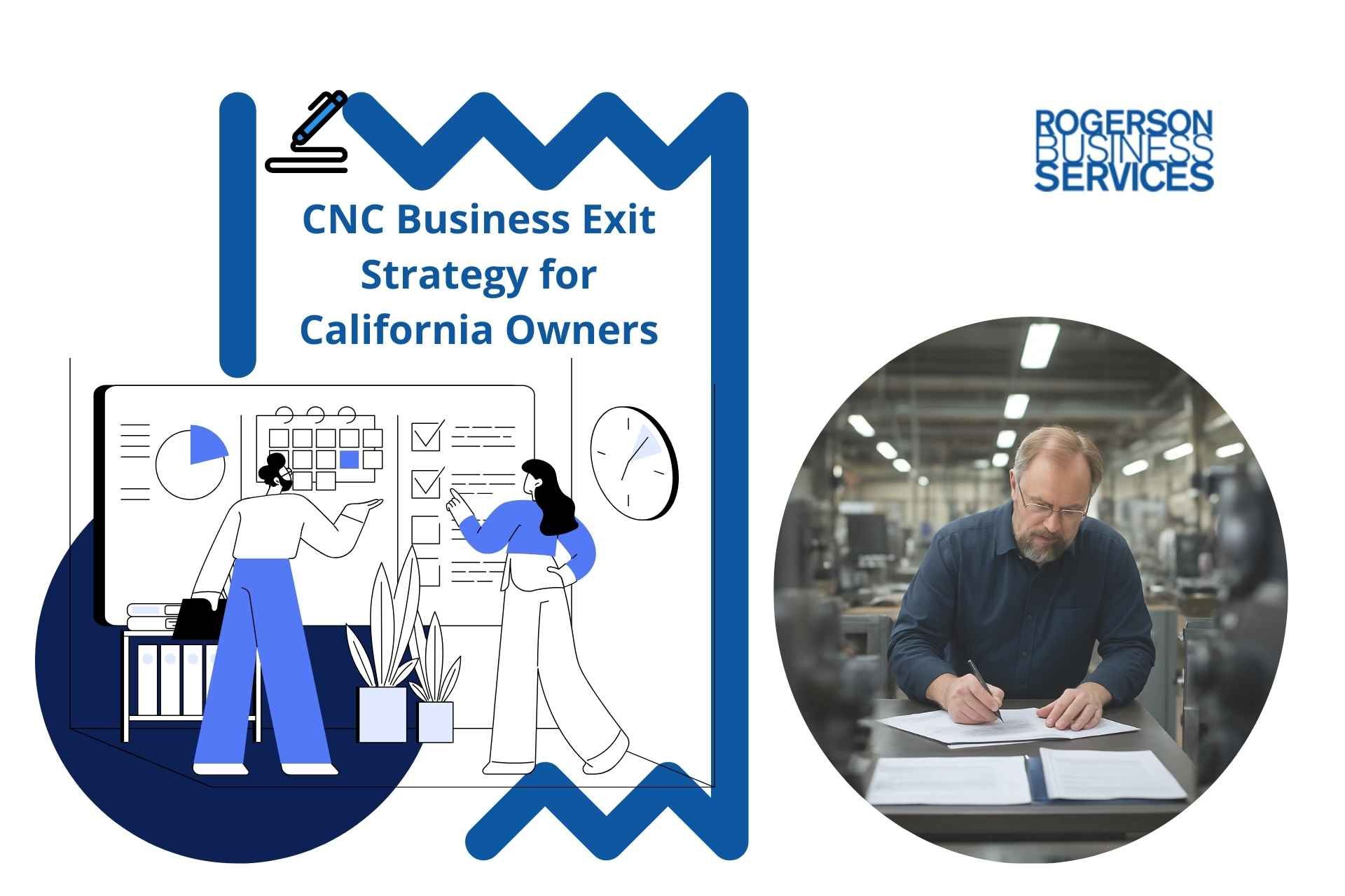6 Tax Planning Tips Before Selling Your Construction Company in California
Tax Planning For a Construction Company in California
In California, capital gains tax is levied on the sale of capital assets, including businesses. We walk you through 6 tips and take a deep dive to understand them.
- Tip One: Review Business Structure
- Tip Two: Understand Tax Implications
- Tip Three: Calculate Potential Gains or Loss
- Tip Four: Plan for Capital Gains Tax
- Tip Five: Factor Any Depreciation
- Tip Six: Anticipate Any Local & State Taxes

Selling your business is a big financial decision to make. Whether you are moving on to greener pastures or simply looking for the opportunity to bow out from the construction industry, several factors must be considered before settling on a merger or acquisition in California.
Too many taxes present a financial deterrent, but to those seeking professional advice on tax planning, a delightful surprise awaits. Professional tax planning places you in a position of power where you can maximize tax benefits, saving you significant money when closing the deal.
Here are a few ways to make the most out of the blood, sweat, and tears that went into building your California construction business.
Review Your Business Structure
California’s taxation system benefits your business’ success, providing a legal environment that fosters exponential progression for construction businesses.
When choosing the best business structure for your lower middle market construction company, you must first evaluate your tax obligations. Your business structure might be enabling or degrading to your overall profit potential. For the average business owner, staying up to date with the different business entities available may prove tedious.
You may need professional help to assess your business and whether it meets the threshold to function as an LLC (limited liability company) or is taxed under the S-Corp umbrella. Depending on your business size, annual returns, number of employees, and payroll specifications, you may or may not benefit from applying for taxation as an S-Corporation.
Here is a brief comparison between LLCs and S-Corps.
When Should You File for the Form 2553?
You should file for form 2553 when you intend to structure your limited liability company as an S-corporation. There are stringent regulations on when this is possible, and it must be no later than a few months into the new tax year or anytime in the previous tax year. S-corporations have several advantages, which include:
Reduced Taxation on Profits Accrued
As the owner of an S-Corp, you get to give yourself a basic salary subject to federal and state taxation, including Medicare and social security. With such a business structure, the remainder of the profits are subject to taxation but are devoid of self-employment taxation that goes towards Medicare and social security. Consequently, you get to take home more cash.
California’s current self-employment tax rate is 15.3%, which is waived once you hit the annual maximum social security contribution of $142,800 as of the 2021 tax year.
Advantages of a Limited Liability Company as a Business Structure
As much as S-Corps might pay less tax under a certain threshold, they are also highly monitored by the IRS and have more filing requirements than limited liability companies.
Additionally, regarding paperwork, S-Corps have additional requirements for employee payrolls. In the long run, this piles up the fees for accounting consultancy. Below a certain threshold, therefore, an S-Corp Is more economical than an LLC.
Limited liability companies are taxed like sole proprietorships and partnerships. They are, therefore, subject to federal, state, and self-employment taxes.
For $100,000 worth of profit, business owners in an LLC must pay self-employment for the total amount.
For $100,000 worth of profit, construction business owners in an S-Corp are required to pay self-employment taxes on the amount that counts as their basic salary. If, for example, you pay yourself $30,000, then $70,000 does not get taxed with self-employment taxes.
A good business structure might save you thousands of dollars and, in the long run, save you more money when formulating a winning tax plan.
Understand the Tax Implications of a Sale
Selling your lower middle market construction business is classified as a taxable event. This means that you must meet your tax obligations within the same year after receiving the proceeds from selling your business. Understanding tax planning can increase the value of your business and make it fetch top dollar during the bidding wars.
In California, there are several tax implications to selling a business. Understanding them is an uphill task, and with the fluid nature of tax legislation, it is hard to stay on top of current trends. However, a professional can help you carry out appropriate tax planning beforehand to help all parties benefit from maximum profits.
The most significant tax implications include the following:
Capital Gains Tax in California
CA capital gains are a tax imposed on the difference between the closing price for your construction company and the money you paid to acquire it, including additional capital that might have been spent to improve the business.
Selling a construction company in the lower middle market is usually straightforward, but there are several ways to get tax deductions on your capital gains tax obligations. You may:
- Donate to charity
- Differentiate between long-term and short-term capital gains
- Sell appreciated assets
With the help of a professional lower middle market business broker, you can familiarize yourself with capital gains tax and how best to approach it when selling your construction business. Sell your construction business on your terms with the help of an M&A deal team.
Goodwill Tax
Goodwill refers to an agreed amount paid by the buyer for the hard items in your business. This might include furniture, fixtures, or any equipment under your belt. Goodwill may also constitute other abstract factors, such as an agreement that limits competition or helps the new buyer learn the ropes of their new investment.
There are two ways by which Goodwill may be taxed. The first and most favorable way is if Goodwill is taxed from an individual shareholder. Goodwill is taxed on both the corporate and individual levels, which might dig deeper into your pockets.
Calculate Your Potential Gain or Loss
Before selling a construction company in California, you need to comprehend your company’s value fully. Knowing exactly how much your construction company is worth allows you to calculate the potential gain or loss accurately.
Tax planning is an essential part of the evaluation process. Knowing the value of your business protects you from surprise losses in the latter stages of finalizing the deal.
A good sell-side advisor will help you put all the pieces on the table and evaluate your business’ worth accurately. Taxation of construction companies is among the many areas of expertise for an M&A advisor.
Plan for the Capital Gains Tax
In California, capital gains tax may deprive you of a significant chunk of the proceeds from selling your construction business.
With proper planning, you may take advantage of the tax deduction opportunities available to your business. Therefore, planning for capital gains tax is an essential aspect of consideration when laying the framework for the transfer of ownership of your business.
Proper planning for capital gains includes evaluating the various loopholes available for lower middle market businesses and seeking the help of a reliable broker with a proven track record. Examples of loopholes in capital gains tax have been highlighted above.
Factor in Any Depreciation Recapture Taxes
Like everything else in the game, you need to stay ahead of depreciation recapture charges to make sure you make the most profit from the sale of your business. In California, the state charges depreciation taxes upon the sale of the business. People prefer to avoid talking about taxes, especially when making an important financial decision, such as selling your business.
Depreciation recapture tax is the tax incurred on selling a depreciating asset at a profit. There are multiple ways to cut down on depreciation recapture taxes, most notably using tools such as investing in 1031 tax-deferred exchange.
The tax rate for depreciation recapture taxes in California is capped at 25%.
Anticipate Any State or Local Taxes That May Apply
Upon the sale of your business, you have limited time before the IRS comes knocking. With the proper counsel, you may avoid falling behind payments, having underpaid your expected taxes, or in the worst-case scenario, being charged with nonpayment. Staying above all these tax requirements might take a lot of work, especially for first-time business owners.
With the right help, you can stay on top of any surprises from both state and local taxes. A registered accountant or tax attorney might help you navigate the murky waters of taxes imposed on construction businesses to help you hang your equipment once and in the right way.
California may be a beautiful place to live, with beautiful sandy beaches and fantastic weather.
Still, the business environment differs for limited liability companies, S-Corporations, C-Corporations, partnerships, and proprietorships. Small businesses have to contend with among the highest taxes in the country.
Taxes may end up putting a foot in the door for your sale, sending you home with less than you deserve if you don’t carry out your planning appropriately.
When questions such as “How can I sell my construction business” cross your mind, it would help to remember the saying that goes, “measure twice, cut once.” Considering selling your construction business? Get a plan in place to minimize your tax implication.
Final Take
The steps you must take to sell a construction business in California can be complex, but doing your research will help ease the stress of it. If you need to sell your lower middle market construction business in 2023 successfully, consider hiring an experienced professional to help you with the sell-side M&A process.
Selling Your Lower Middle Market Construction Business Now or Not Ready
If you are a retiring business owner looking to exit your lower middle market construction company in California, here are five tips to get you started:
1. Don't wait until the last minute to start planning your exit. The process of selling a lower middle market construction business can take a long time, so it's important to start early.
2. Have a clear idea of what you want to get out of the sale. Know your goals and what you're willing to negotiate.
3. Choose the right type of buyer. Not all buyers are created equal, so do your research and find the right one for your business.
4. Be prepared for a lot of due diligence. M&A buy-side due diligence is when buyers will want to know everything about your business, so be ready to provide documentation and answer questions.
5. Be flexible with the terms and conditions of the deal. It's important to be open to negotiation to get the best possible deal for your business.
Rogerson Business Services, also known as, California's lower middle market business broker is a sell-side M&A advisory firm that has closed hundreds of lower middle-market deals in California. We are dedicated to helping our clients maximize value and achieve their desired outcomes.
We have a deep understanding of the Californian market and an extensive network of buyers, which allows us to get the best possible price for our clients. We also provide comprehensive support throughout the entire process, from initial valuation to post-closing integration.
Our hands-on approach and commitment to our client's success set us apart from other firms in the industry. If you consider selling your lower middle market construction business, we would be honored to help you navigate the process and realize your goals.
If you have decided to value and then sell your lower middle market construction company or still not ready, get started here, or call toll-free 1-844-414-9600and leave a voice message with your question and get it answered within 24 hours. The deal team is spearheaded by Andrew Rogerson, Certified M&A Advisor, he will personally review and understand your pain point/s and prioritize your inquiry with Rogerson Business Services, RBS Advisor
Go to the next article: Part of tips to selling a construction company in California series ->
Hey there! Can we send you a gift?
We just wanted to say hi and thanks for stopping by our little corner of the web. :) we'd love to offer you a cup of coffee/tea, but, alas, this is the Internet.
However, we think you'll love our email newsletter about building value and properly position your company before transition/exit your business ownership.
As a special welcome gift for subscribing, you'll also get our helping and educational guides, tips, tutorials, etc.. for free.
It's filled with the best practices for retiring serial business owners like Dan Gilbert, Larry Ellison, Warren Buffett, and many more.
Just sign up for our emails below.


